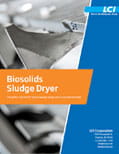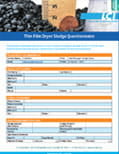Thermal sludge drying equipment designed to simply and safely dry dewatered sewage sludge in a sustainable and configurable process.
Sustainable
Configurable
Accepts any Feed Sludge including:
Outputs as variety of dried sludge characteristics:
Construction and Design can be tailored to:
Simple
The Dryer requires no back-mixing or extruder systems for feeding as sludge is directly pumped into the dryer. The small exhaust vapor stream lowers electrical use and emissions control requirements.
Single non-heated auger requires:
Automated Operation allows:
Single, simple, bolted blades and preconfigured trolly system allow quick and easy Maintenance at the operation floor level.
Safe
Proven
In 2015, the U.N. developed 17 Sustainable Development Goals. Chip Pless dives into the industries at a crossroads with biosolids.
Future of Biosolids Disposal
Carbon Sequestration from Biosolids
Why is Sludge Drying Important
What Problems Do Thin Film Sludge Dryers Solve
LCI’s thin film sludge dryers can accept a wide range of sludge types such as digested or undigested sludge, primary and/or secondary sludge, industrial sludge, sludge with high amounts of high strength waste or Biomass, sludge which is poorly dewatered, “sticky” sludges, and more.
Safety is paramount when drying sludge. Dried sludge is combustible and therefore needs to be treated as such. The highest risk for fire and explosion is generally the combustible dust from the drying process. LCI and our parent company Nederman have vast experience in explosive dust applications and the NFPA (National Fire Protection Association) codes surrounding dust applications.
One of the highest operational cost associated with Sludge Drying is the thermal and electrical energy to dry the material. Increases in efficiency associated with energy consumption can significantly reduce the cost of operating a dryer system. Due to the “Thin Film” design of our dryer, LCI can boast of having one of the highest thermal and electrical efficiencies on the market.
The product discharged from a drying system is very important as to the end use of the dried material. The characteristics of the end product are different depending on the application the material is used in. LCI’s experience in the granulation market make us a perfect partner to assist in developing a dryer system which can generate the end product the application requires.
Dryers release moisture which contains different compounds which must be considered. With ever increasing air standards it is important to understand and treat the moisture released from a dryer system. LCI’s parent company, Nederman, is know as the “Clean Air Company” and our sister company Mikropul specializes in Industrial Air Filtration so LCI has the experience to assist in the emissions control requirements of drying applications.

Thin Film Thermal Sludge Dryer Brochure
Thin Film Thermal Sludge Dryer Questionnaire